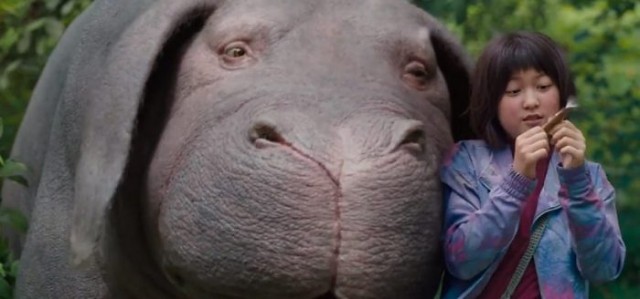The festival opens on June 30 with the international premiere of Thai high-school thriller Bad Genius and closes on July 16 with the U.S. premiere of the South Korean revenge thriller The Villainess. The festival’s centerpiece gala is Mikhail Red’s ecological thriller Birdshot from the Philippines.
The special guests will be on hand, including the Star Hong Kong Lifetime Achievement Award recipient Eric Tsang (actor, director, producer of numerous HK films), two Star Asia Awards winners Chutimon “Aokbab”Chuengcharoensukying (Bad Genius) and Jung Byung-gil (The Villainess).
The festival this year launches its competition for first- and second-time directors whose films are receiving their North American premiere at the festival. The seven films competing are Bad Genius (Thailand), Birdshot (Philippines), A Double Life (Japan), Jane (South Korea), Kfc (Vietnam), and With Prisoners (Hong Kong).
The festival runs June 30 through July 16.
WET WOMAN IN THE WIND
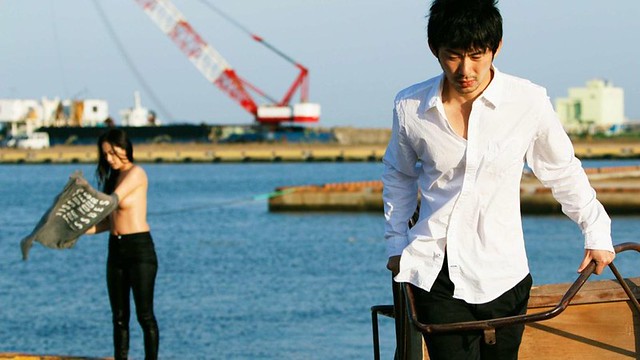
Kosuke (Nagaoka Tasuku), a recluse playwright who swore off women and the city life, leads a solitary life in a tiny shack in the woods. He witnesses Shiori (Mamiya Yuki) impulsively plunging into the sea with her bike. Is she nuts? She then takes off her wet top, dries it and puts it back on again in front of him. "I'm on to you," she says. So starts Wet Woman in the Wind, the first of five films from Nikatsu Studio's planned Roman Porno revival.
Kosuke violently rejects the advances of energetic, unrelenting Shiori who throws herself into his life every chance she gets. She makes his rare interactions with others all the more tense and difficult. Their physical cat and mouse rough and tumbles are interrupted, then exacerbated by Kosuke's admiring city theater troupe dropping in, causing more chaotic sexual escapades.
Shiota Akihiko's 'pinku' movie is a dutifully low budget, short sex-comedy, obeying its original Roman Porno rule- sex every ten minutes. So the sex scenes are aplenty including threesome and lesbian sex. Mamiya, topless most of the time, is a firebrand. Shiota makes most of the two leads' energy with his long takes. Sunny and light, Wet Woman is good times.
A QUIET DREAM
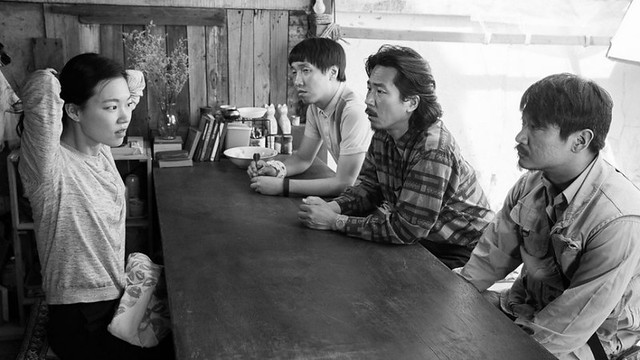
Korean-Chinese director Zhang Lu's A Quiet Dream falls somewhere between Jarmusch and Hong Sang-soo. Sumptuously shot in black and white, the film revolves around Yeri (Han Yeri), a Korean-Chinese girl, running a small makeshift bar/stall out of her house, supporting her wheelchair bound father, and a trio of good for nothings (Yang Ik-joon of Breathless, Park Jung-bum, Yun Jong-bin) who practically live at the bar. Even though they are very different from each other (Yang- a small time gangster, Park- a quiet North Korean defector, Yun- an idiot with an epileptic fit who happens to be a landlord of Yeri), they all have one thing in common - they are all infatuated with beautiful, kind Yeri.
Yeri playfully responds to their small-time desires, yet delicately maintains this four-way relationship. Boys get jealous of each other but at the end of the day, they are all together, helping each other up. Her unassuming beauty and charm even attract a local tomboy whose affection she later softly deflects. As the film unhurriedly unfolds, we get to know the background of each character little by little. They constantly talk, drink, smoke and do drunken karaoke.
Zhang has been portraying the lives of down-and-out foreigners in the margins of Korean society and A Quiet Dream is no exception. He portrays their small-time predicaments in life with much empathy and care. Their rootless, lonely existence is presented as an ideal, comfortable place to be. Unlike Jarmusch's interlopers who are constantly on the move, Yeri and the trio are stuck in their tiny haven that they created, living and loving the eternal present. As the title suggests, each of their small scenario from their day-to-day lives can be seen as a dream. Comfortably chatty, beautifully drawn characters with their blemishes and all, A Quiet Dream is as comfortable and gentle as your favorite old pair of shoes.
JAPANESE GIRLS NEVER DIE
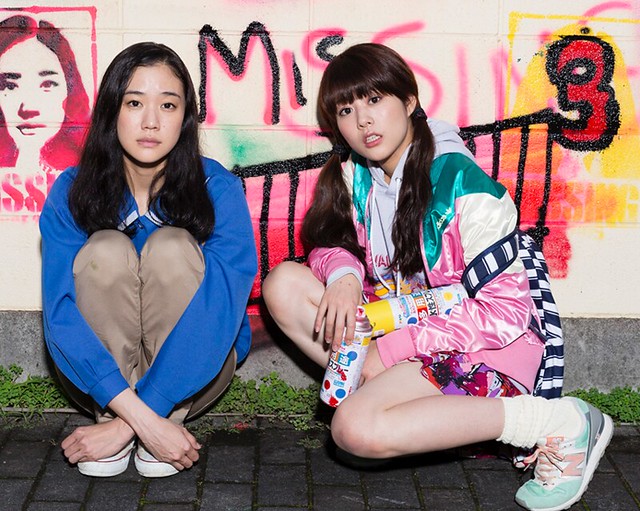
With its intentionally jumbled chronology, Japanese Girls Never Die goes on to tell the story of Haruko (Aoi Yu), an aimless 27 year old who works at an office and still lives at home. Then there is an accidental graffiti artists and an anarchic High School girl gang on a crime spree, beating up unsuspecting men subplots. In series of flash forward, we learn Haruko hooking up with a grocery store clerk/childhood playmate, Soga (Ishizaki Huey). She has to deal with daily sexism at work place - hearing male superiors shit talking 35-year old, unmarried female co-worker and constantly being asked whether she has a boyfriend, then told she won't have problems getting married because how she looks. They even say to her point blank that they'd rather hire a 18 yr old girl with no experience rather than a male applicant with experience because they have to dole out more money for a male workers.
Then she goes missing. Yukio and Manabu, two 20 yr olds working dead end jobs and Aina (Takahata Mitsuki), a slightly pumped up version of cutesy Japanese girl - blinged out cell phone and a gaggle of flush toys on her car dashboard, start stenciling Haruko's face from the police missing sign all over the neighborhood walls. The image goes viral and gets tied into the violent crimes perpetrated by the girl gang. In her absence, Haruko becomes a unwitting heroine of a movement.
Japanese Girls Never Die is a strong indictment of the society where girls are subjugated and sexualized at an early age. It's a structurally daring, thought provoking work. Aoi Yu, the baby faced star of millennial classics like All About Lily Chou-Chou and Hana and Alice does a great job, carrying the burden of being twenty something female in society where self-worth is hard to come by. It's crazy to think that Aoi is old and therefore can easily be discarded. What kind of world is this? Even though it's more than a decade apart from each other, it would make a great double feature with Kurosawa Kiyoshi's Bright Future.
BAMSEOM PIRATES SEOUL INFERNO
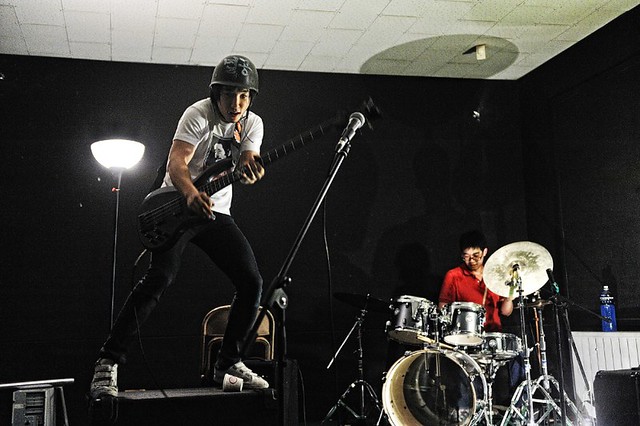
Just to give you a little bit of background here: South Korean president Park Geun-hye was impeached, then indicted on corruption charges in March 2017, ending a decade of right wing regimes that started with Lee Meung-bak, a former CEO of Hyundai Construction in 2008, had maintained a hardline on North Korea while didn't do much for stagnant economy. The nation's youth, directionless and hopeless about their future, armed with social networking tools, riled up against the rigid, highly hierarchical, money hungry society.
Bamseom Pirates, a grindcore duo Kwon Yong-man (drums, vocal) and Jang Sung-gun (bass, vocal) made a splash in underground music scene with their unintelligible shouting of songs accompanied by pure noise that lasts barely one minute each. In a pure punk spirit, in order to criticize highly capitalistic, anti-commie regime, they used images (dated North Korean propaganda they found on the internet, in a crude Power Point presentation) and lyrics praising North Korea and its cult leaders in an ironic fashion in their songs. Director Jung Yun-suk follows the band around and records their gigs in abandoned university buildings, at anti-establishment demonstrations on the streets and small venues.
Seoul Inferno refers to the North Korea's fiery rhetoric where they were describing that if there is a war, there will be an inferno in Seoul in a matter of minutes, since the city is less than a 30 miles away from the border. It was the title of their first album in 2010, with titles like "All Hail, Kim Jung-il" and so on.
They get in trouble when their producer Park Jung-gun gets arrested for breaking the National Security Law, for tweeting some ironic pro-North Korean slogans. During the trial, Kwon, who has to take the witness stand, has to confront many of the political implications of the music Bamseom is making. They are questioned about the band's identity. In their minds, the South and the North are not that different. They are like piss and shit. Same difference. Now try to imagine explaining this to your suit wearing defense lawyer.
Bamseom lasted about 5 years, they announced that they were disbanding on their facebook in 2016. Just like every underground punk band, it's the youthful rebellion that matters the most. No matter their political beliefs or their stance, it’s their energy that is infectious. Long Live Kim Jung-il!
